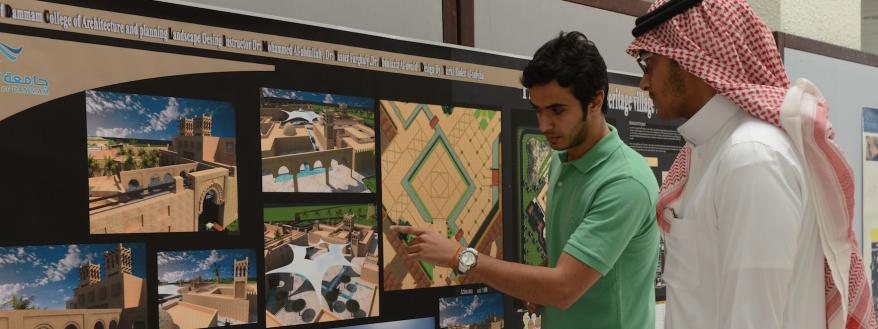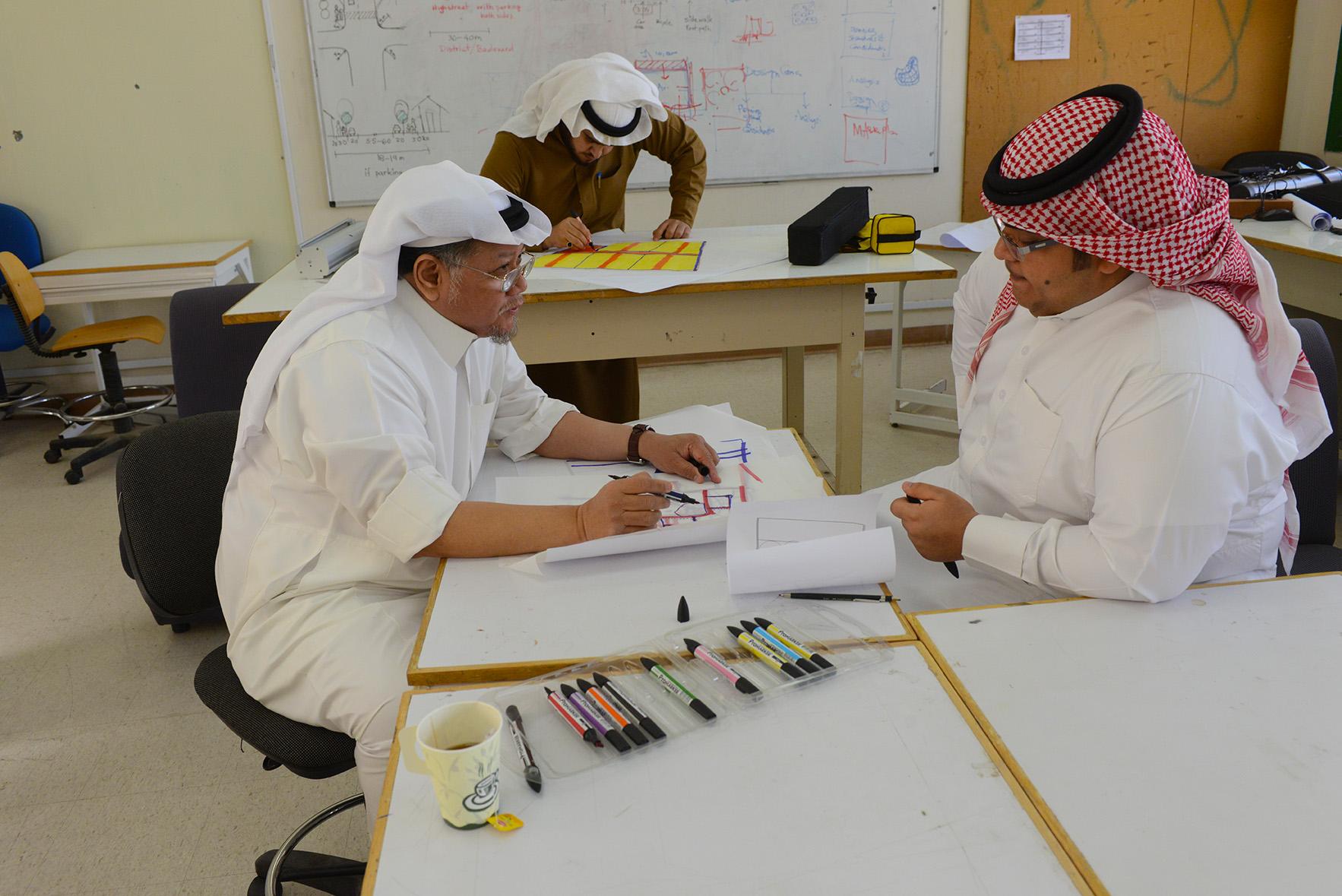
Introduction

The College of Architecture and Planning was established in 1395 AH/1975 CE as a part of King Faisal University, which is now known as the Imam Abdulrahman Bin Faisal University. Since that time, the College of Architecture and Planning has become the cornerstone for architecture, planning and built environment education in Saudi Arabia. The College is made up of five departments: Architecture, Urban and Regional Planning, Building Engineering, Landscape Architecture and Interior Architecture.
Since its inception, the College has played an important role in building generations of qualified personnel capable of contributing to advancing the progress of Saudi Arabia. The College over the past three decades has graduated more than 1,600 Saudi engineers (1,300 males and 300 females) in addition to 159 engineers of other nationalities.
The College offers Master of Science degrees in the disciplines of Architecture, Urban and Regional Planning, Building Engineering and Landscape Architecture. A doctorate program is also offered in Urban and Regional Planning. Over 200 students have completed their graduate degrees at the College of Architecture and Planning.
Since the beginning of the 1426/1427 AH, 2005/2006 CE, academic year, the College has offered a PhD degree in Urban and Regional Planning. The Urban and Regional Planning doctoral students are prepared to begin their professional lives in three main areas: academia, where they would conduct research as well as teach; working in the field of urban development in either the public or private sectors in various social or economic departments throughout the Kingdom or in the field of applied research and studies.
The faculty consists of professionals and scholars who have studied at some of the world’s most renowned universities. The Department’s faculty members have experience in managing, following up and supporting the research and teaching activities of undergraduates and graduate students as well as encouraging them in their community service projects. These faculty members are involved with not only their own scientific research projects, but also are also involved in the supervision and assessment of research papers, theses and dissertations of undergraduates and graduate students.
The facilities at the College of Architecture and Planning include a number of scientific laboratories used in a wide range of research areas such as: architecture, construction, environmental studies, acoustics, building materials, surveying, lighting, concrete, heat, landscape architecture, environmental design, computer and geographic information systems as well as remote sensing labs. The College also has a number of educational support facilities available to students and faculty including: an audio visual aid office, an academic competition facility, an architectural model making facility, a photography lab, a practical training and technical support office, and an office for consultation and architecture research as well as one for geographical information systems.
During the first or Preparatory year, the prospective students of the College of Architecture and Planning take the same courses as the new students to either the College of Engineering or the College of Design. They all complete their Preparatory year in the Engineering tack. In the second year, also known as the common year, the students will take a course load that all second year students in the College of Architecture and Planning are required to take while fulfilling the University’s and College’s requirements in subjects such as Islamic culture, the sciences and mathematics. In the required Computer Applications course, the students will not only improve their English language skills since English scientific and professional terms will be emphasized, but they will be trained in using scientific references that will help them later on in their respective fields.
The first two years play a crucial role in determining what specialization and specific degree the students will choose to pursue, through theoretical coursework that exposes them to the concepts of environmental design, engineering as well as a more hands on program of study that helps develop their visual expression through manual drawing. After successfully completing the second year requirements, the student will enroll in one of the five departments of the College where he will spend the next three years. Students will receive their Bachelor of Science degrees after they have successfully earned 170 credit hours and have completed all of their practical training requirements.
The College of Architecture and Planning’s Laboratories play a key role in research and in the practical aspects of the students’ coursework:
- Acoustics Lab
- Building materials Lab
- Surveying Lab
- Lighting lab
- Concrete Lab
- Heat Lab
- Landscape Architecture Lab
- Geographic Information Systems Lab
The College of Architecture and Planning is home to the Center for Urban Studies and a Consultancy Center. This Center offers specialized short courses as well as initiating and conducting professional studies, while also specializing in advisory work for all sectors of society. The College is also home to the University Document Center as well as a number of educational support facilities listed below::
- Audio visual aid Unit
- Academic Competitions Unit
- Architectural Models Unit
- Photography Unit
- Practical Training Unit
- Technical Support Unit
These laboratories and units serve the educational process and scientific research for undergraduate and graduate studies and as well as providing professional consultants for society. The Center for Urban Studies and the Consultancy Center at the College offer specialized short courses and provide professional studies and advisory work for all sectors of society.
Vision
The College seeks to provide distinguished and high quality education and training in order to prepare competent professionals in planning, design and construction of sustainable built and urban environments, to promote scientific research in different fields of environmental design and to serve the community in various capacities.
Mission
The College is committed to educate and prepare trained professionals in environmental design who can practice their profession and also conduct scientific research, enabling them to keep pace with the rapid developments of the profession and to serve the community more effectively.
Objectives
The College will achieve its vision and mission of attaining scientific and professional excellence domestically and globally in the areas of architectural and urban planning education, scientific research and community service. The objectives of the College may be grouped in the three categories as follows:
1. Excellence in urban education:
- To provide all the necessary components of the educational process including: faculty and staff, curricula, study plans and methods of teaching, a creative teaching environment and advanced computer hardware and software.
- To prepare students professionally, scientifically and ethically and to develop the curricula by taking into account the diversity and comprehensiveness of the national needs and to achieve the right balance between theory and practice.
- To prepare qualified graduates in the different fields of environmental design for the challenges of postgraduate studies in order to become specialized and highly qualified professionals of environmental design as well as to conduct work in various academic fields such as research, applied studies and development management and to carry out expert consultant services.
- To help students gain various skills such as expressive, symbolic graphs and IT skills that will enable them to design projects and learn different methods for the preparation of scientific and technical reports.
- To increase the students' awareness of environmental and renewable energy resources.
- To encourage the students to become scholars so that they will be able to assess the potential environmental impact of policies and programs, as well as upgrade their statistical and analytical skills.
- To help nurture and develop the leadership, organizational and administrative capabilities of the students.
2. Excellence in scientific research:
- To carry out scientific and applied research in various urban development sectors with the aim of improving the natural and man-made components of the environment, to direct decision-making and to rationalize the use of resources required to serving the needs of the community.
- To develop scientific research in order to increase the understanding and theoretical principles of architecture and urban development within the framework of both Arab and Islamic traditional values, as well as the conservation of these values through the adoption of the philosophy of comprehensiveness, sustainability and compatibility within the local environment, when developing and implementing architectural and urban designs.
- Develop scientific research in order to increase the awareness of the natural environment, energy and water resources, which are fundamental to the development process.
- To develop scientific research that leads to a greater understanding of what kind of potential environmental impact might occur based on specific policies and programs as well as ensure that the students have the research skills, background and understanding in statistics and analytical methods in order to properly assess, interpret and quantify their results.
3. Excellence in community service:
- To contribute to the workforce demands within the Kingdom as well as within the GCC region by providing professional environmental design engineers, who are academically qualified with bachelor, master or doctoral degrees in the various disciplines of environmental design who can support the aspirations of the region.
- To contribute to development planning and administrative leadership skills for municipal and local administration personnel, who are responsible for the physical, economic and social development sectors of a variety of institutions found throughout the Kingdom.
- To develop continuing education technical programs for personnel working in the field, in both the public and private sectors, in order to develop their professional capabilities and to familiarize them with new developments in the profession through seminars, workshops and other community service events
- To provide professional services and specialized consulting studies for public and private beneficiaries in the various areas of development.
- To guide the students and faculty members in selecting research topics, study and graduation projects and theses so that they reflect local community issues and the environment.
- To contribute in refereeing competitions and in reviewing professional programs and projects set up for local and regional development.
